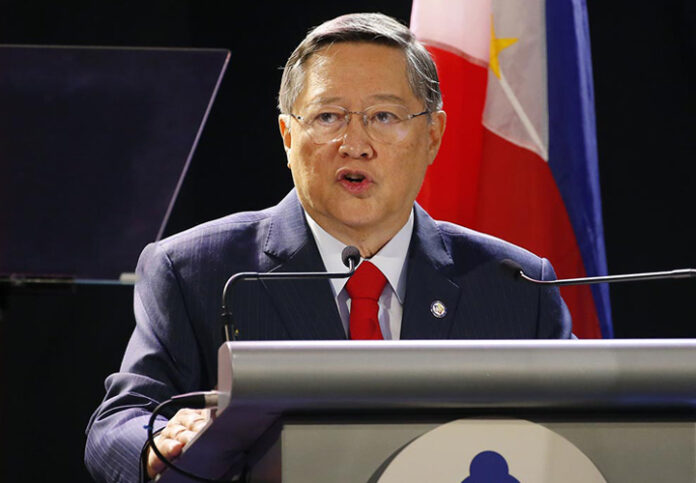
THE national government was not “gun shy” in terms of helping Filipinos who lost their jobs and sources of livelihoods during the pandemic, according to the Department of Finance (DOF).
In the Financial Executives Institute of the Philippines (Finex) forum on Wednesday, Secretary Carlos G. Dominguez III said the national government could “reconsider” its current policy on spending if such is warranted in light of the threat of the Delta variant.
The administration has been criticized for the amount of Social Amelioration Program (SAP) it gave to Filipinos forced to stay home by lockdowns.
Apart from the amount received, some groups have said the amount allocated would not be able to cover all those who are in need.
“What we want to do is do what is reasonable and affordable for us and future generations. If we have a more difficult situation, of course we will reconsider the path we are on,” Dominguez said.
“We’re not gun shy and we will keep our mind open to all possibilities. But as of the moment, I think we have tread a path that is sustainable, that is reasonable and I think that has preserved our resources for possible events such as another surge,” he explained.
P660B so far
Dominguez said the recent report from the Department of Budget and Management (DBM) stated that the government has already spent P660 billion for the country’s Covid-19 response.
He said the government has also allocated $1.7 billion for the purchase of vaccines. Of this amount, $1.3 billion was obtained by the government through loans from the World Bank, Asian Development Bank, and the Asian Infrastructure Investment Bank.
This has allowed the government to procure vaccines, he said, adding that the country has already received 28 million doses in the second quarter. Additional 71 million doses will also be received by the third quarter and 55 million in the last quarter of the year.
“We literally have the resources to acquire more than enough vaccines to inoculate a hundred percent of our adult population this year. The only thing holding back our vaccination program is tight global vaccine supply,” Dominguez said in his presentation at the Finex forum.
“Plans for future horizon vaccines are now being evaluated for 2022 onwards. These include the inoculation of our children as well as the administration of booster shots for those already vaccinated. The proposal is to include such supplemental amounts in the 2022 budget,” he added.
Local revenues
IN a cable TV interview, Dominguez said should the government require additional funds, these can be raised through local revenues which have already started to recover.
He noted that the government’s revenues have increased by 13 percent to P1.245 trillion in the January-to-May period this year versus the P1.102 trillion recorded in the same period last year.
Dominguez said the pandemic was to blame for the decline in revenues. Total revenue collection in 2020 contracted 9 percent to P2.856 trillion from $3.138 trillion in 2019.
Should the local revenues be insufficient, Dominguez said the Philippines can still access the credit markets in order to raise what it needs to plug the deficit.
“Lower revenue collections and a higher public health bill translate into budget deficits. To cover the budget gap, we had to borrow more. It is a necessity. This is the way the world works. Fortunately, with our high credit ratings, it was not difficult to engage in emergency financing with concessional rates,” Dominguez told the Finex forum.
However, he admitted there is only so much the government can do to raise funds and so far that domestic resources can go. Dominguez said this is where the passage of key legislations is crucial.
The passage of the Public Service Act and the Retail Trade Liberalization Act, for instance, is vital in making the country a more attractive destination for foreign investments, he said.
He admitted that the country may not have enough domestic resources to finance high-quality services that Filipinos need. This includes telecommunication services which have been crucial in work and study from home arrangements while observing the lockdown rules.
“Why will you limit, for instance, owning a telco, to 40 percent for foreign investments. Quite frankly, I don’t think we have enough money to, enough resources domestically to give the Filipino people the type of telco they need,” Dominguez said.
Based on data from the Philippine Statistics Authority (PSA), total foreign investments (FI) approved in the first quarter of 2021 reached P19.55 billion, a 32.9-percent contraction from P29.14 billion in the same period in 2020.
The FI commitments for the first quarter of 2021 were mainly driven by investments from Japan which accounted for 54.8 percent of the total approved FI, followed by Cayman Islands with 5.8 percent and South Korea, 3 percent.
Japan committed P10.72 billion, while Cayman Islands and South Korea pledged P1.14 billion and P592.63 million, respectively.
Approved projects with foreign interest in the first quarter of 2021 were projected to generate 18,416 jobs based on reports of the Investment Promotion Agencies (IPA).
The data was collected by the PSA from the Board of Investments (BOI), Clark Development Corp. (CDC), Philippine Economic Zone Authority (Peza), Subic Bay Metropolitan Authority (SBMA), Authority of the Freeport Area of Bataan (AFAB), and Cagayan Economic Zone Authority (Ceza).
Read full article on BusinessMirror



